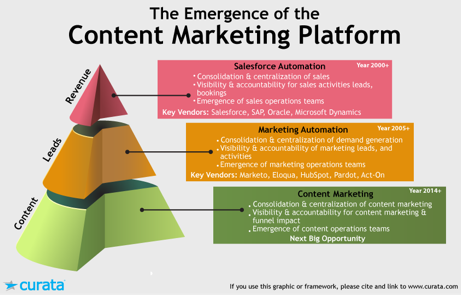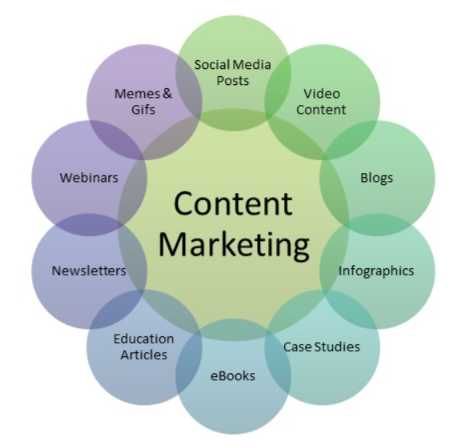A content marketing platform helps you manage and optimize content creation. It streamlines your content strategy, making it more effective.
Content marketing is essential for businesses today. Creating, distributing, and managing content can be challenging. This is where a content marketing platform comes in. It provides tools to plan, create, and distribute content efficiently. With this platform, you can track performance and make data-driven decisions.
It simplifies collaboration among team members and ensures consistency in your brand’s voice. In this blog, we will explore what a content marketing platform is and how it can benefit your business.

Credit: curata.com
Introduction To Content Marketing Platforms
Content marketing platforms (CMPs) have become essential tools for modern marketers. These platforms streamline the creation, management, and distribution of content. They help businesses engage with their audience effectively. Let’s explore what CMPs are and why they matter.
Definition And Purpose
Content marketing platforms are software solutions. They assist in planning, creating, and distributing content. CMPs offer a unified space for managing all content-related activities. This includes blog posts, social media updates, videos, and more.
The main purpose of CMPs is to enhance content strategy. They ensure content aligns with business goals. CMPs also provide analytics to measure content performance. This helps in refining the content strategy over time.
Importance In Modern Marketing
In the digital age, content is king. CMPs play a crucial role in modern marketing. They help in maintaining a consistent brand voice. CMPs also ensure content reaches the right audience at the right time.
Here are some key benefits:
- Efficiency: CMPs streamline the content creation process. This saves time and resources.
- Collaboration: They allow teams to collaborate seamlessly. This improves the quality of content.
- Analytics: CMPs provide valuable insights. These insights help in making data-driven decisions.
By using a content marketing platform, businesses can stay ahead in the competitive market. They can engage with their audience more effectively. CMPs also help in building trust and credibility.
Key Features Of Content Marketing Platforms
Understanding the key features of Content Marketing Platforms can help businesses streamline their content strategy. These platforms offer a range of tools designed to enhance every aspect of content marketing. Let’s explore some of the essential features that make these platforms invaluable.
Content Creation Tools
Effective content creation is at the heart of any content marketing strategy. Content Marketing Platforms provide a suite of tools to help create engaging content. These tools include:
- Text Editors: For writing and formatting blog posts, articles, and more.
- Image Editors: To create and edit visuals that complement your content.
- Video Tools: For producing high-quality videos and integrating them into your content.
- Templates: Pre-designed templates for various types of content like infographics, social media posts, and emails.
Content Distribution Channels
Distributing content across multiple channels is crucial for reaching a wider audience. Content Marketing Platforms offer several distribution options:
- Social Media Integration: Automatically share content on platforms like Facebook, Twitter, and LinkedIn.
- Email Marketing: Create and send newsletters to your subscribers.
- Content Management Systems (CMS): Seamlessly publish content on your website or blog.
- Partnership Networks: Collaborate with other websites and influencers to expand your reach.
Analytics And Reporting
Tracking and analyzing the performance of your content is vital for continuous improvement. Content Marketing Platforms provide robust analytics and reporting features:
- Real-Time Analytics: Monitor how your content is performing as soon as it goes live.
- Engagement Metrics: Track likes, shares, comments, and other forms of audience interaction.
- Conversion Tracking: Measure how your content contributes to conversions and sales.
- Custom Reports: Generate detailed reports tailored to your specific needs and goals.
Benefits Of Using Content Marketing Platforms
Content marketing platforms offer numerous benefits to businesses. These platforms streamline and improve various marketing tasks. This can lead to better results and more efficient operations.
Efficiency And Productivity
Content marketing platforms help automate repetitive tasks. This saves time and reduces manual errors. Automated scheduling and publishing make content management easier. Teams can focus on creating quality content instead of handling administrative tasks. Overall, this boosts productivity and efficiency.
Enhanced Collaboration
These platforms provide centralized access for team members. Everyone can work together in real time. This improves communication and reduces misunderstandings. Team members can share feedback and make edits easily. Collaboration tools help in organizing tasks and tracking progress. This leads to smoother workflows and better teamwork.
Better Audience Targeting
Content marketing platforms offer insights into audience behavior. This helps in creating content that resonates with the audience. Analytics tools provide data on what content performs best. Marketers can use this data to refine their strategies. Better targeting results in more effective marketing campaigns. This can lead to higher engagement and conversions.
Top Content Marketing Platforms
Content marketing platforms help manage, create, and distribute content. They streamline processes and improve content strategy. Finding the right platform can be challenging. Here, we explore some top options.
Popular Platforms Overview
Several content marketing platforms stand out in the industry. These platforms offer various tools and features to enhance content marketing efforts. Let’s take a closer look at some popular options.
HubSpot: Known for its powerful CRM and marketing tools. HubSpot provides blogging, SEO, and social media management.
CoSchedule: A robust platform with a marketing calendar. CoSchedule helps organize content and improve team collaboration.
ContentStudio: Focuses on content curation and publishing. ContentStudio offers social media management and analytics.
SEMrush: Primarily an SEO tool. SEMrush also supports content marketing with keyword research and competitive analysis.
Comparison Of Features
Comparing features can help identify the best platform for your needs. Here, we break down key features of each platform.
HubSpot: Offers a comprehensive suite of tools. Includes CRM integration, SEO, email marketing, and analytics.
CoSchedule: Provides a marketing calendar, task management, and analytics. Great for team collaboration and project tracking.
ContentStudio: Focuses on content curation, social media management, and analytics. Suitable for social media-heavy strategies.
SEMrush: Primarily an SEO tool with added content marketing features. Includes keyword research, site audits, and competitive analysis.
Each platform has unique strengths. Choose based on your specific content marketing needs.
How To Choose The Right Platform
Choosing the right content marketing platform is crucial for your business. It helps you manage, create, and distribute content efficiently. With many options available, it can be daunting. To simplify, focus on these key areas.
Assessing Business Needs
First, identify your business goals. Are you looking to increase brand awareness? Do you want to drive more traffic to your website? Different platforms offer varied features. Ensure the platform aligns with your objectives.
Next, consider your target audience. Who are they? Where do they spend their time online? The platform should help you reach your audience effectively. Also, think about your content type. Do you primarily use blogs, videos, or social media posts? Choose a platform that supports your content format.
Evaluating Platform Capabilities
Look into the platform’s features. Does it offer content creation tools? Can you schedule posts in advance? Check if it has analytics to track performance. These features can save time and provide valuable insights.
Also, review the platform’s user interface. Is it easy to navigate? A user-friendly interface reduces learning time and boosts productivity. Ensure it integrates with other tools you use. Compatibility is key for seamless operations.
Budget Considerations
Budget is a major factor. Determine how much you are willing to spend. Some platforms offer free versions with limited features. Others require a subscription fee. Weigh the cost against the benefits.
Also, consider the long-term value. A cheaper option may lack essential features, leading to higher costs later. Investing in a robust platform can provide better returns in the long run.
Implementing A Content Marketing Platform
Implementing a Content Marketing Platform (CMP) can streamline your content processes. This implementation involves several critical steps. These ensure a smooth transition and effective usage.
Planning And Strategy
Start with a clear content strategy. Define your goals. Identify your target audience. Outline the types of content you need. This step sets the foundation for your CMP.
Create a detailed plan. List the resources required. Assign tasks to team members. Use a timeline to track progress. Effective planning ensures your CMP aligns with your business goals.
Onboarding And Training
Onboarding is crucial for smooth integration. Introduce your team to the CMP. Provide comprehensive training. Ensure everyone understands the platform’s features and benefits.
Offer continuous support. Address any queries promptly. Use tutorials and guides. Regular training keeps your team updated with the latest features. This maximizes the CMP’s potential.
Integration With Existing Systems
Ensure your CMP integrates with existing systems. This includes CRM, email marketing tools, and analytics software. Seamless integration avoids data silos and enhances efficiency.
Check compatibility with your current tools. Conduct tests to ensure smooth operation. Regularly update the CMP and your systems. This keeps your processes running smoothly.
Here’s a table to summarize the key integration points:
| System | Integration Points |
|---|---|
| CRM | Customer data synchronization |
| Email Marketing | Campaign management |
| Analytics | Performance tracking |
Implementing a CMP requires careful planning and execution. Follow these steps for a successful integration.
Best Practices For Using Content Marketing Platforms
Content marketing platforms help streamline content creation and distribution. To get the best results, follow these best practices. They ensure your content reaches the right audience and achieves your goals.
Creating High-quality Content
Focus on producing valuable and relevant content. Understand your audience’s needs and interests. Use clear and simple language. Keep sentences short and to the point. High-quality content engages readers and encourages sharing.
Optimizing Content Distribution
Choose the right channels for your content. Use social media, email newsletters, and blogs. Schedule posts for optimal times. Ensure your content is mobile-friendly. This increases your content’s reach and impact.
Measuring Success
Track key performance indicators (KPIs) to measure success. Monitor metrics like page views, engagement rates, and conversions. Use analytics tools to gather data. Adjust your strategy based on the insights. Regularly review your performance to stay on track.

Credit: www.searchenginejournal.com
Challenges And Solutions
Content marketing platforms help businesses manage, create, and distribute content. Yet, they come with their own set of challenges. Understanding these challenges and knowing the solutions can make a big difference.
Common Issues Faced
Many businesses face similar issues with content marketing platforms. One common problem is the lack of time. Creating quality content takes effort and time, which businesses often don’t have.
Another issue is inconsistent content. Without a clear strategy, the content may lack coherence. This can confuse the audience and reduce engagement.
Limited resources also pose a challenge. Smaller teams may struggle to produce regular content. They may lack the skills or budget to create diverse content types.
Data management can be problematic. Tracking content performance requires proper tools and expertise. Without these, it’s hard to measure success and make improvements.
Effective Solutions
There are solutions to these common problems. For the time issue, consider using scheduling tools. These tools help plan and automate content posting. It saves time and ensures regular updates.
To solve inconsistent content, develop a clear content strategy. Define your goals, target audience, and key messages. This provides direction and ensures all content aligns with your brand.
For limited resources, outsource some content tasks. Hiring freelancers or agencies can help manage workload. They bring expertise and fresh ideas to your content.
To handle data management, invest in analytics tools. These tools track content performance and provide insights. Use this data to refine your strategy and improve results.
Future Trends In Content Marketing Platforms
Content marketing platforms are rapidly evolving. New technologies and trends shape the future of these platforms. Understanding these trends is crucial for staying ahead in the game.
Emerging Technologies
Emerging technologies are transforming content marketing platforms. Artificial intelligence (AI) and machine learning (ML) are at the forefront. AI helps in content creation and personalization. ML analyzes user data to predict trends and behaviors.
Blockchain technology is gaining traction too. It offers transparency in content creation and distribution. Blockchain can secure content ownership and prevent plagiarism.
Augmented reality (AR) and virtual reality (VR) are enhancing user experiences. Brands use AR and VR to create immersive content. These technologies increase user engagement and interaction.
Predictions For The Industry
The content marketing industry is set to grow. AI and ML will become more integrated. These technologies will automate content creation and distribution. This will save time and resources for marketers.
Personalization will be key. Users will expect personalized content. Platforms will use data to deliver tailored experiences.
Video content will dominate. Short-form videos will be more popular. Brands will invest in video production to capture audience attention.
Interactive content will rise. Quizzes, polls, and interactive infographics will engage users. These tools will provide valuable insights into user preferences.
Voice search will influence content strategies. Marketers will optimize content for voice search. This will improve accessibility and reach.
Content marketing platforms will integrate with other tools. Seamless integration will improve efficiency. Marketers will manage all their tasks from a single platform.

Credit: wpswings.com
Frequently Asked Questions
What Is A Content Marketing Platform?
A Content Marketing Platform (CMP) is a tool that helps plan, create, distribute, and measure content. It streamlines content marketing processes and improves efficiency.
How Does A Cmp Work?
A CMP integrates various tools for content creation, distribution, and analytics. It centralizes these functions to simplify content management.
Why Use A Content Marketing Platform?
Using a CMP improves content strategy, efficiency, and results. It helps manage content processes, collaboration, and performance tracking.
What Features Do Cmps Offer?
CMPs offer features like content planning, creation, distribution, analytics, and team collaboration. They provide a comprehensive solution for content marketing.
Conclusion
A content marketing platform helps streamline your content creation process. It saves time and boosts efficiency. You can easily manage campaigns and measure performance. This tool also helps with collaboration among team members. Choosing the right platform can enhance your marketing strategy.
Remember to consider your business needs before selecting one. Start exploring options today to find the best fit.



